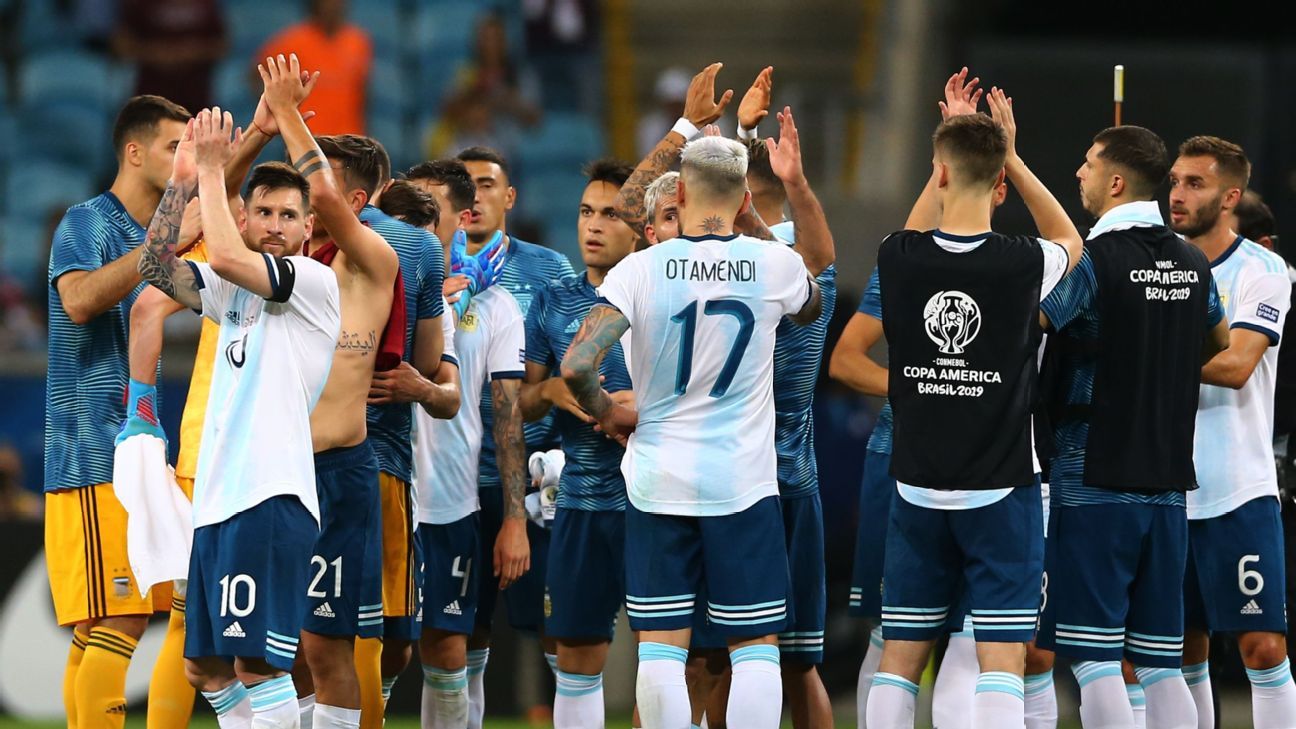
There's an easy trap every manager must avoid: Don't give your idea of play more importance than the players at your disposal. In other words, work with what you've got, don't work around it.
This trap explains the thoroughly predictable disaster of Argentina's World Cup campaign last year. Jorge Sampaoli is one of the most interesting coaches around, but his bold, high-press tactic requires quick defenders and a goalkeeper who is good with his feet. Argentina have neither, and the result was chaos.
Sampaoli was on a fat, long-term contract. To get rid of him, the Argentine football association were forced into making a big-money pay-off. The inexperienced Lionel Scaloni replaced Sampaoli on a long-term-caretaker basis because he had an attractive record in qualification. He was also relatively cheap.
Scaloni promptly fell into a similar trap to Sampaoli. He announced his bold strategy for Argentina: to build a team that was quick on the transitions, using two wingers and playing the ball swiftly into wide spaces. But there was a huge problem, which became apparent when Argentina's best player returned to international duty.
This idea does not fit Lionel Messi.
- Report: Argentina sneak past Qatar
- Copa America 2019: Full results, fixtures and feature coverage
One of the wingers would have to be sacrificed, destroying the overall plan. Scaloni was aware of this. When Messi came back to the fold for a friendly against Venezuela in March, the coach tweaked his system. He played three centre-backs, allowing him to have two attacking wing-backs who would supply the width. The problem was that Argentina's three centre-backs were unable to defend against the strength of Salomon Rondon and the pace of the Venezuelan wingers.
Scaloni returned to his original idea, one he knew would not work with Messi, and the outcome was the opening-day defeat against Colombia. Since then, under the pressure of a major tournament, he has been trying to dig himself out of a hole.
The parts started to fit when Sergio Aguero replaced Roberto Pereyra at half-time in the second game against Paraguay. Argentina started to inch toward something more coherent, and this was repeated in the shape of the side that beat Qatar 2-0 and secured a place in the quarterfinals where they'll take on Venezuela (Friday, June 28, 3 p.m. ET, live on ESPN+).
Aguero plays up front with the young lion Lautaro Martinez, which means they have to put in a defensive shift. Leandro Paredes anchors the midfield, with the right-footed Rodrigo De Paul to his right and left-footed Giovani Lo Celso to his left, leaving Messi free to wander and combine with them. Instead of quick transitions to the flanks, Argentina are aiming to pass their way through the middle instead. There could be a lack of width -- either Messi or one of the strikers needs to move out wide at times -- but crucially, there is now a circuitry of passing. Messi has partners with whom to dialogue.
Of course, all of these changes are much easier to implement when the opponent is as obliging, as Qatar proved at the start of Sunday's match in Porto Alegre. The pressure on Argentina was instantly lifted when they were handed a bizarre early goal, with Martinez latching on to an appalling ball across his own penalty area by Al Rawi.
0:45
Argentina make it through to the quarter-finals
To watch the 2019 Copa America, sign up for ESPN+.
It's also worth mentioning the circumstances of the clinching second goal. Aguero scored with a memorable solo strike, picking up Paulo Dybala's pass and, in typical fashion, keeping his balance to shoot back across the goalkeeper. But by this stage Qatar had gone for the all or nothing, taking off one of their centre-backs and bringing on an extra striker.
Argentina have not suddenly changed from water to wine. Rather, as tournament football demands of teams that hope to win, they are making progress as the competition goes on. Nothing that Scaloni does, though, can improve the individual quality of his defenders. The defects that scuppered his predecessor, Sampaoli, namely a lack of defensive pace and a goalkeeper who is good with his feet, are still present and incorrect. In the quest to build a circuit of passing, his team is also playing without a specialist defensive midfielder.
Will coach Scaloni tighten things up and be more cautious in Friday's quarterfinal? He's well aware of the attacking threat posed by his opponents, too: the very Venezuela side who gave him a beating in Madrid in March. Or does he trust his own side to impose themselves on the game?
Argentina's travelling army of fans would doubtless prefer the latter. And with humiliation avoided and confidence restored, they can march on to Rio de Janeiro, the city they took over during the 2014 World Cup, and bring their drums and singing to the Maracana stadium for the next round.















 Phone: (800) 737. 6040
Phone: (800) 737. 6040 Fax: (800) 825 5558
Fax: (800) 825 5558 Website:
Website:  Email:
Email: 






